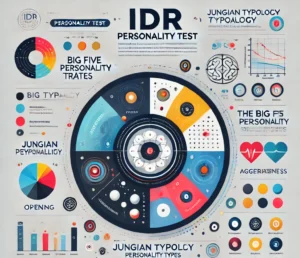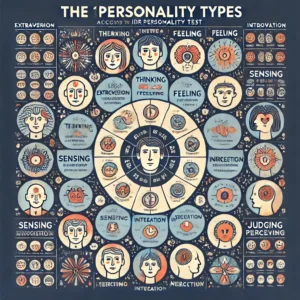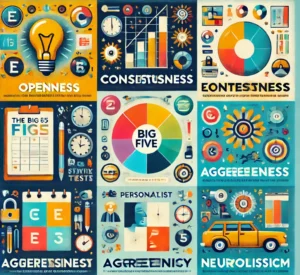INTRODUCTION
In today’s world, self-awareness is an essential component of personal growth, career advancement, and building strong relationships. People often seek insights into their behavior, emotional tendencies, cognitive processes, and social dynamics to better understand themselves and improve their interactions with others. One of the most effective ways to gain this insight is through personality tests, and the IDR Personality Test has become one of the most popular and scientifically grounded assessments available. This free online test offers valuable insights into your psychological traits, helping you understand your emotional responses, decision-making processes, social behavior, and much more.
The IDR Personality Test is based on established psychological frameworks, combining elements of Jungian Typology and the Big Five Personality Traits, two of the most widely recognized models in the field of psychology. The test is designed to assess your preferences in various domains, from how you process information and make decisions to how you relate to others and handle stress. Whether you’re interested in personal growth, career guidance, or improving your relationships, the IDR Personality Test provides a comprehensive way to explore your personality.
This article will provide a detailed exploration of the IDR Personality Test, covering its origins, how it works, the science behind it, the different personality types it identifies, and how you can use the results for practical self-improvement.
What is the IDR Personality Test?
The IDR Personality Test is an online, free-to-use personality assessment that offers valuable insights into your unique personality. It evaluates various aspects of your cognitive, emotional, and social tendencies, categorizing you into one of 16 distinct personality types. The test is based on two primary psychological frameworks—Jungian Typology and The Big Five Personality Traits—both of which are well-researched and widely accepted in the field of psychology.
Jungian Typology
Carl Jung, a Swiss psychiatrist and psychoanalyst, developed the Jungian Typology theory, which divides people into 16 different personality types based on their preferences in four cognitive functions:
Extraversion (E) vs. Introversion (I): This dimension describes how individuals focus their energy. Extraverts are energized by external stimuli and thrive in social situations, while Introverts prefer solitude and introspection, finding energy in their inner thoughts.
Thinking (T) vs. Feeling (F): This dimension refers to how people make decisions. Thinking types tend to make decisions based on logic, facts, and objective analysis, while Feeling types prioritize emotions, values, and personal considerations when making choices.
Sensing (S) vs. Intuition (N): This trait describes how individuals perceive and process information. Sensing types focus on concrete details and present realities, while Intuitive types are more interested in abstract concepts, patterns, and future possibilities.
Judging (J) vs. Perceiving (P): This dimension reflects how individuals approach the outside world. Judging types prefer structure, organization, and planning, while Perceiving types are more adaptable, spontaneous, and open to change.
By combining these four dichotomies, Jung identified 16 distinct personality types, each represented by a unique four-letter acronym. For example, an ENFJ is an Extraverted, Intuitive, Feeling, and Judging personality type, while an INTP is Introverted, Intuitive, Thinking, and Perceiving.
The IDR Personality Test uses these 16 personality types to categorize individuals, offering a deeper understanding of their psychological traits and preferences.

The Big Five Personality Traits
The Big Five Personality Traits (also known as the Five-Factor Model or FFM) is another well-established model used in the IDR Personality Test. This model categorizes personality into five broad dimensions, which are considered the core aspects of human personality. These dimensions are:
Openness to Experience: This trait reflects an individual’s creativity, curiosity, and willingness to explore new ideas and experiences. High Openness is often associated with creativity, imagination, and a preference for novelty, while low Openness tends to correlate with a preference for tradition, routine, and the familiar.
Conscientiousness: This trait indicates how organized, responsible, and goal-oriented a person is. Highly conscientious individuals are detail-oriented, reliable, and disciplined. On the other hand, those low in conscientiousness may struggle with organization and tend to be more spontaneous.
Extraversion: Extraversion describes an individual’s sociability, energy, and desire for interaction. Extraverts are talkative, outgoing, and energized by social activities, while Introverts are more reserved and prefer solitude.
Agreeableness: This dimension reflects how empathetic, cooperative, and considerate a person is toward others. People high in Agreeableness are compassionate, friendly, and willing to compromise, while those low in this trait may be more competitive, critical, and less inclined to cooperate.
Neuroticism: Neuroticism measures emotional stability. Individuals with high Neuroticism experience more negative emotions such as anxiety, depression, and irritability, while those low in neuroticism are more emotionally stable, calm, and resilient in stressful situations.
By assessing these five broad dimensions, the IDR Personality Test provides a comprehensive and nuanced view of your personality, offering insights into your emotional tendencies, cognitive preferences, and social behavior.
How Does the IDR Personality Test Work?
The IDR Personality Test uses a series of multiple-choice questions to assess various aspects of your personality. These questions are carefully designed to measure your preferences and tendencies in areas such as decision-making, emotional responses, interpersonal dynamics, and cognitive processing. The process of taking the test and understanding the results can be broken down into several steps:
Taking the Test
The test consists of multiple-choice questions that address different aspects of your behavior and thought patterns. Each question typically offers several possible answers, and your task is to select the option that best reflects how you typically respond in certain situations. For example, you might be asked questions like:
How do you prefer to make decisions?
- Based on logical analysis
- Based on personal values and emotions
When faced with a problem, do you prefer to: A. Focus on facts and details
- Think about the broader possibilities and patterns
How do you recharge after a busy day?
- By spending time with others
- By spending time alone, reflecting or reading
These questions are designed to reveal your underlying preferences in relation to the Big Five dimensions and Jungian Typology.
Analyzing Your Responses
Once you’ve completed the test, your answers are processed through an algorithm that matches your responses with the Big Five Personality Traits and the 16 Jungian Personality Types. The algorithm uses established psychological principles to analyze how your answers align with these personality frameworks.
Generating Your Personality Type
The results of the test categorize you into one of the 16 personality types from the Jungian Typology and provide a detailed report on your Big Five traits. Each of the 16 personality types represents a unique combination of preferences for Extraversion vs. Introversion, Thinking vs. Feeling, Sensing vs. Intuition, and Judging vs. Perceiving.
In addition to identifying your personality type, the test will also provide detailed scores for each of the Big Five traits. For example, you may receive a high score in Openness to Experience, a low score in Neuroticism, and a moderate score in Extraversion.
Receiving Your Personalized Report
Once your responses have been analyzed, you will receive a personalized personality report that outlines the following:
Your personality type: This will include a four-letter personality code (e.g., ENFP, ISTJ), which provides insights into your cognitive preferences and behavioral tendencies.
Your scores on the Big Five dimensions: Each of the five traits will be scored, offering a quantitative measure of where you stand on each dimension.
Detailed analysis of your personality: The report will explain how your traits influence your thinking, decision-making, social interactions, and emotional responses.
Recommendations for personal growth: The report may also offer advice on how to leverage your strengths and work on areas that require improvement, helping you to achieve personal and professional goals.

The Science Behind the IDR Personality Test
The IDR Personality Test is built on two of the most well-established and scientifically validated personality models: Jungian Typology and The Big Five Personality Traits. Both of these models are widely accepted in the field of psychology and have been extensively researched and tested.
Jungian Typology:
Carl Jung’s Jungian Typology is one of the foundations of modern psychology. It focuses on understanding how individuals process information and make decisions based on their cognitive preferences. Jung’s theory asserts that individuals are naturally inclined to use one of two opposing preferences on each of the four dimensions (Extraversion vs. Introversion, Thinking vs. Feeling, Sensing vs. Intuition, Judging vs. Perceiving).
This framework allows for the categorization of people into 16 distinct personality types, offering insight into their thinking patterns, emotional responses, and how they engage with the world around them. The IDR Personality Test leverages these personality types to provide a comprehensive understanding of your cognitive preferences and social behavior.
The Big Five Personality Traits:
The Big Five Personality Traits are another cornerstone of the IDR Personality Test. This model has been extensively researched and is considered one of the most robust and reliable frameworks for understanding personality. Each of the five traits represents a continuum, and individuals can fall anywhere along that spectrum:
Openness to Experience measures an individual’s creativity and willingness to explore new ideas.
Conscientiousness assesses an individual’s organization, reliability, and goal-orientation.
Extraversion measures how sociable, energetic, and outgoing a person is.
Agreeableness gauges empathy, cooperativeness, and trustworthiness.
Neuroticism evaluates emotional stability and the tendency toward negative emotions.
The combination of these two models enables the IDR Personality Test to offer a comprehensive, well-rounded assessment of an individual’s personality traits, making it a reliable tool for self-exploration and growth.
Why Take the IDR Personality Test?
There are several key reasons why people take the IDR Personality Test. Whether you’re seeking personal growth, career insights, or relationship advice, understanding your personality can help guide you toward making better decisions and living a more fulfilling life.
Self-Awareness:
The primary benefit of taking the IDR Personality Test is the enhanced self-awareness it provides. By understanding your personality, you can gain valuable insights into how you think, feel, and behave. Self-awareness allows you to identify your strengths and weaknesses, which is essential for personal development. It can help you recognize patterns in your emotional responses, decision-making processes, and interpersonal interactions.
Career Guidance:
The IDR Personality Test can also offer valuable career guidance. Your personality traits play a significant role in determining the types of professions and work environments where you will thrive. For example, if you score highly in Extraversion, you may find that careers in sales, customer service, or public relations align with your natural sociability and energy. Alternatively, if you score high in Conscientiousness, you may excel in structured roles that require attention to detail, such as project management, finance, or administration.
Improved Relationships:
Understanding your personality can greatly improve your ability to relate to others, whether in personal, professional, or romantic contexts. The IDR Personality Test provides insight into your communication style, conflict resolution strategies, and how you express emotions. By knowing your tendencies, you can adapt your behavior to better connect with others and resolve conflicts effectively.
Personal Growth and Development:
Taking the IDR Personality Test is a powerful tool for personal growth. The test provides insights into your behavior, decision-making, and emotional tendencies, which can help you identify areas for improvement. For instance, if your results show that you score high on Neuroticism, you can take proactive steps to manage stress and emotional reactions. Likewise, if your score on Openness is low, you might consider challenging yourself to explore new ideas, hobbies, or experiences that push you out of your comfort zone.
By understanding your personality through the IDR Personality Test, you can also improve your self-esteem and confidence. Gaining insight into your strengths and recognizing areas where you can grow empowers you to set goals, overcome challenges, and pursue new opportunities with a clearer sense of direction.
Relationship Compatibility:
Another important reason for taking the IDR Personality Test is to assess compatibility with others, especially in romantic relationships. The test helps you understand how your personality interacts with those around you, offering insight into your communication styles, emotional needs, and conflict resolution strategies. It provides guidance on how to navigate challenges within relationships by offering a deeper understanding of each other’s behaviors and preferences.
For example, an INTP might prefer logical discussions, while an ESFJ might value emotional support and practical solutions. Understanding these differences can help couples appreciate their unique qualities and work together to strengthen their bond. In friendships, knowing whether you or your friend is more introverted or extroverted can enhance communication and reduce misunderstandings.
What Personality Types Does the IDR Personality Test Identify?
The IDR Personality Test classifies individuals into one of 16 distinct personality types, each represented by a four-letter acronym. These personality types are based on Jungian Typology, a theory that classifies individuals based on their preferences in how they think, feel, and interact with the world.
Here is a breakdown of the 16 personality types and what they represent:
ISTJ (The Inspector): Logical, methodical, and detail-oriented, ISTJs are known for their sense of duty and reliability. They value tradition and prefer structured environments.
ISFJ (The Protector): Caring, loyal, and meticulous, ISFJs are nurturing and attentive to the needs of others. They excel in roles that require empathy and service.
INFJ (The Advocate): Deep, insightful, and highly intuitive, INFJs are passionate about helping others and are often drawn to roles that require empathy and vision.
INTJ (The Architect): Strategic, independent, and visionary, INTJs are known for their logical thinking and desire for competence and mastery in their fields.
ISTP (The Crafter): Practical, adaptable, and action-oriented, ISTPs are often skilled with tools and hands-on tasks. They are flexible and thrive in dynamic, unpredictable environments.
ISFP (The Composer): Creative, artistic, and sensitive, ISFPs are deeply attuned to beauty and often pursue artistic or creative endeavors.
INFP (The Mediator): Idealistic, empathetic, and deeply reflective, INFPs are often driven by their personal values and a desire to make the world a better place.
INTP (The Thinker): Analytical, independent, and curious, INTPs love solving complex problems and are driven by their intellectual interests.
ESTP (The Dynamo): Energetic, adventurous, and action-oriented, ESTPs excel in fast-paced environments and are often found in roles that require quick thinking and decision-making.
ESFP (The Entertainer): Sociable, spontaneous, and playful, ESFPs love being the center of attention and thrive in social settings.
ENFP (The Campaigner): Enthusiastic, creative, and charismatic, ENFPs are driven by a desire to connect with others and inspire positive change in the world.
ENFJ (The Protagonist): Charismatic, empathetic, and insightful, ENFJs are natural leaders who inspire others with their vision and passion for helping people.
ESTJ (The Executive): Organized, practical, and efficient, ESTJs value structure and tradition. They excel in leadership roles and prefer clear, defined goals.
ESFJ (The Consul): Friendly, empathetic, and social, ESFJs are great at building relationships and thrive in collaborative environments.
ENFP (The Champion): Creative, passionate, and empathetic, ENFPs are imaginative and deeply care about personal values and relationships.
ENTP (The Debater): Innovative, witty, and intellectual, ENTPs are known for their quick thinking and love of debate and problem-solving.

How Accurate is the IDR Personality Test?
One of the main advantages of the IDR Personality Test is its accuracy and reliability. Based on widely accepted models in psychology (such as Jungian Typology and The Big Five Personality Traits), the test’s design ensures that it accurately measures important aspects of your personality. It’s important to remember that no personality test is entirely definitive; however, tests like the IDR Personality Test are based on years of psychological research and provide highly reliable results.
Moreover, the IDR Personality Test offers a comprehensive analysis, helping users see the nuances of their personality and providing insight into their cognitive and emotional tendencies. The test is regularly updated to ensure that it stays aligned with the latest developments in psychological research, making it a valuable tool for anyone seeking to better understand their personality.
FAQ About the IDR Personality Test
Here are some frequently asked questions (FAQs) about the IDR Personality Test to help you better understand how it works, what it measures, and how to interpret the results.
Q1: How long does the IDR Personality Test take?
A1: The IDR Personality Test typically takes around 10 to 20 minutes to complete, depending on your speed in answering the questions. It consists of multiple-choice questions that assess various aspects of your personality, such as cognitive preferences, emotional responses, and social behavior.
Q2: Is the IDR Personality Test free to take?
A2: Yes, the IDR Personality Test is completely free to use. There is no cost to take the test, and it provides you with a personalized report at no charge.
Q3: Can the results of the IDR Personality Test change over time?
A3: While personality traits are relatively stable over time, they can evolve based on your experiences, personal growth, and changes in your environment. For example, your Extraversion may increase as you gain confidence in social settings, or your Neuroticism may decrease if you work on managing stress. Therefore, taking the test periodically can help you track changes in your personality.
Q4: How should I interpret my results from the IDR Personality Test?
A4: The results of the IDR Personality Test provide a snapshot of your current personality traits and preferences. It is important to understand that personality tests are not definitive but rather tools for self-exploration. Use the results as a guide for personal growth, relationship building, and career development. Keep in mind that no personality type is better than another; each one comes with unique strengths and challenges.
Q5: Can the IDR Personality Test be used for career counseling?
A5: Yes, the IDR Personality Test can provide valuable insights into the types of careers that align with your personality. For example, individuals with high Conscientiousness and Judging preferences may thrive in structured, leadership roles, while those with high Openness and Perceiving traits may excel in creative and flexible environments. The results can serve as a helpful starting point for career exploration.
Conclusion
The IDR Personality Test offers a fascinating and scientifically backed approach to understanding your personality. By taking this free online test, you can gain valuable insights into your behavior, thinking patterns, emotional responses, and social tendencies. Understanding these traits is essential for personal growth, building better relationships, and making more informed decisions in your career and personal life.
Whether you’re looking to improve your self-awareness, gain career insights, or enhance your relationships, the IDR Personality Test can provide the guidance you need to move forward with confidence and clarity. With its scientifically grounded foundations, accurate results, and comprehensive analysis, the IDR Personality Test is an indispensable tool for anyone seeking to unlock their full potential and lead a more fulfilling life.



[…] for Better and Worse 6 Shocking Ways Influencers Gonewild Are Redefining Fame and Fortune 7 Surprising Benefits of the IDR Personality Test: Unlock Strengths and Avoid Pitfalls Conduct Disorders With Personality Disorders: 7 Essential Distinctions 7 Proven Ways to Stop […]